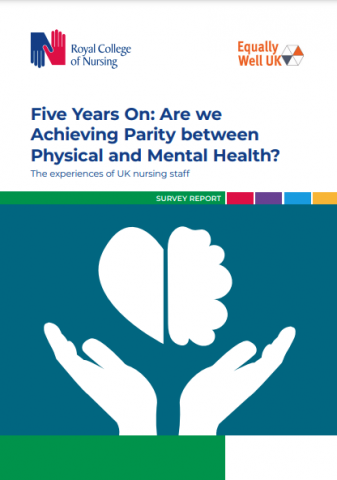Less than one in 10 nurses believe mental health care gets as much attention as physical health care, new data from the Royal College of Nursing (RCN) has revealed.
The findings comes from RCN’s recent parity of esteem work – a phrase that means valuing mental health equally to physical health.
The survey revealed around two thirds (67.9%) of respondents believe the country they work in has been unsuccessful in ensuring mental health is on a level playing field with physical health.
Only approximately one in 10 (9.9%) believed their country has been successful.
The results were similar when the question focused on the respondent’s local NHS service – six in 10 (59.6%) deemed equality of mental and physical health to be unsuccessful, while one in 10 (13%) thought parity had been achieved.
The survey garnered 4,424 responses with around three quarters (73%) being from staff in a physical health care setting while the rest were from people working in a mental health care setting.
Nearly seven in 10 (69.6%) of those working in physical health considered extra training as the most helpful avenue to better equip them to meet their patients’ mental health needs.
This was closely followed (54.2%) by the ability to work more intimately with other services – i.e., primary care.

When those predominantly working in a mental health setting were asked what would help them meet their patient’s physical needs, most people (68.4%) considered stronger partnerships to be the most important – slightly less (63.4%) favoured further training.
“It appears that achieving equity for mental health services is no longer a priority,” said NHS Providers’ deputy chief executive, Saffron Cordery, responding to the survey results.
“Mental health care needs more long-term investment, including for staff, for capital to transform dated facilities and for early intervention and prevention, to give patients the high-quality, 21st century treatment they need.”
In the report’s foreword, the Centre for Mental Health’s chief executive, Andy Bell, said: “This survey is a reminder that the path to parity is a long and difficult one. There are some signs of progress since 2018, and these are welcome. But there remain many challenges, and the events of the last five years have made it even more difficult to achieve parity in practice.”
He continued: “Poor access to mental health support, shortcomings in emergency care, and the continued separation between mental and physical health throughout the system are notable concerns throughout this report.”
The survey comes on world mental health day and follows a call from the NHS Confederation to address the “national emergency” in mental health services that is leading to the elevated waiting times in A&E.
To read RCN’s the full report, click here.
Image credit: iStock



















